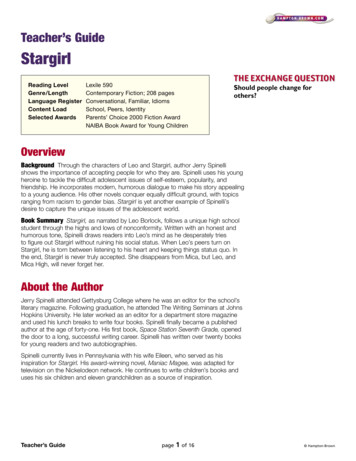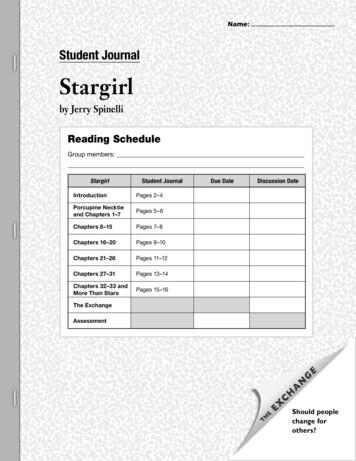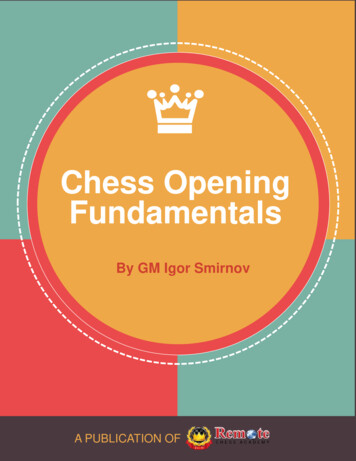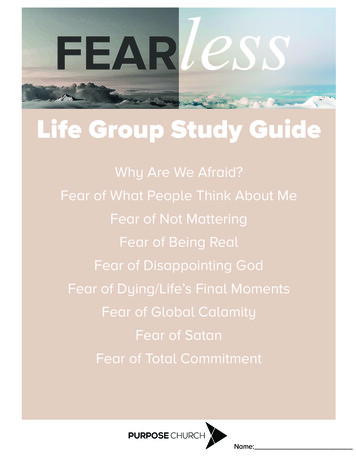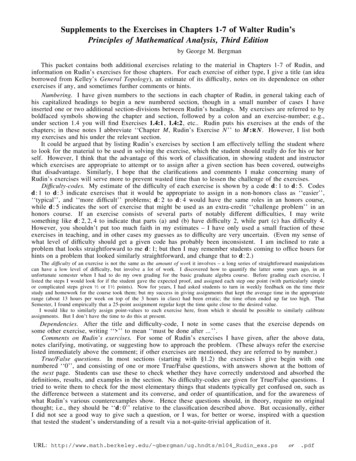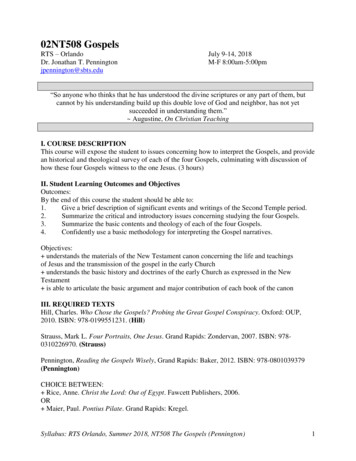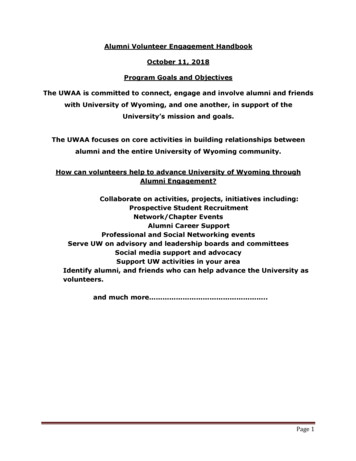
Transcription
T h eM e s s a g eO fT h eQ u r a nChapters1. AlFatiha (The Opening Chapter) .222. AlBaqara (The Heifer).243. Al'Imran (The Family of 'Imran).1084. AlNisa' (The Women).1545. AlMa'idah (The Repast) .2046. AlAn'am (The Cattle).2457. AlA'raf (The Faculty of Discernment).2848. AlAnfal (The Spoils of War).3279. AlTawbah (The Repentance).35110. Yunus (Jonah).39511. Hud (The Prophet Hud).42712. Yusuf (Joseph).462Al Ra'd (The Thunder).48813.14. Ibrahim (Abraham).50815. Al Hijr (The Rocky Tract).52316. Al Nahl (The Bee).539Al Isra' (The Night Journey).57217.18. Al Kahf (The Cave).60019. Maryam (Mary).627Ta Ha.64520.4
T h eN o b l eQ u r ' a nAl Anbiya' (The Prophets).66921.Al Hajj (The Pilgrimage).69322.Al Mu'minun (The Believers).71223.24. Al Nur (The Light).72825. Al Furqan (The Criterion).75126. Al Shu'ara (The Poets).76427. Al Naml (The Ants).785Al Qasas (The Narrations).80328.29. Al 'Ankabut (The Spider).82630. Al Rum (The Romans).840Luqman.85331.32. Al Sajdah (The Prostration).86033. Al Ahzab (The Confederates).86534. Saba' (Sheba).88135. Fatir (The Originator or Creation).90236. Ya Sin.911Al Saffat (Those Ranged in Ranks) .92437.38. Sad.94139. Al Zumar (Crowds).95540. Ghafir (Forgiver) .974Fussilat (Clearly Spelled Out).99141.5
T h eN o b l eQ u r ' a nAl Shura (Consultation).100342.43. Al Zukhruf (The Gold Adornments).10176
Al Dukhan (The Smoke).103344.Al Jathiyah (The Kneeling Down).104045.Al Ahqaf (Winding Sand-tracts).104746.Muhammad.105647.Al Fath (The Victory).106548.Al Hujurat (The Chambers).107649.Qaf.108250.Al Dhariyat (The Winds That Scatter).109051.Al Tur (The Mount).109652.Al Najm (The Star).110253.Al Qamar (The Moon).111154.Al Rahman (The Most Gracious).111955.Al Waqi'ah (The Inevitable).112656.Al Hadid (Iron).113457.Al Mujadilah (The Woman who Pleads).114458.Al Hashr (The Mustering).115359.Al Mumtahinah (That Which Examines).116160.Al Saff (The Battle Array).116761.Al Jumu'ah (Friday).117162.Al Munafiqun (The Hypocrites).117463.www.islamicbulletin.org 7
Al Taghabun (The Mutual Loss and Gain).117764.Al Talaq (Divorce).118165.Al Tahrim (Prohibition).118566.Al Mulk (The Dominion).119067.Al Qalam (The Pen).119568.Al Haqqah (The Sure Reality).120369.Al Ma'arij (The Ways of Ascent).120870.Nuh (Noah).121271.Al Jinn (The Spirits).121672.Al Muzzammil (The Enwrapped One).122273.Al Muddaththir (The Enfolded One).122574.Al Qiyamah (The The Ressurection).123575.Al Insan (Man).123976.Al Mursalat (Those Sent Forth).124477.Al Naba' (The Tiding).124778.Al Nazi'at (Those That Rise) .125279.'Abasa (He Frowned).125780.Al Takwir (The Folding Up).126081.Al Infitar (The Cleaving Asunder).126382.Al Mutaffifin (The Dealing in Fraud).126583.www.islamicbulletin.org 8
Al Inshiqaq (The Rending Asunder).127084.Al Buruj (The Constellation).127285.Al Tariq (The Night Star).127586.Al A'la (The Most High).127787.Al Ghashiyah (The Overwhelming Event).127989. Al Fajr (The Daybreak).128288.90. Al Balad (The City).128491. Al Shams (The Sun).128792. Al Layl (The Night).1289Al Duha (The Glorious Morning Light).129093.94. Al Sharh (The Opening-Up of the Heart).129295. Al Tin (The Fig).129396. Al Alaq (The Clinging Clot) or Iqra' (Read!).129597. Al Qadr (The Night of Power or Honour).129898. Al Bayyinah (The Clear Evidence).1299Al Zalzalah (The Earthquake).130299.Al 'Adiyat (Those That Run).1303100.Al Qari'ah (The Great Calamity).1304101.Al Takathur (The Piling Up).1305102.Al 'Asr (Time Through the Ages).1306103.www.islamicbulletin.org 9
Al Humazah (The Scandalmonger).1306104.Al Fil (The Elephant).1307105.Quraysh (The Tribe of Quraysh).1309106.107. Al Ma'un (The Neighbourly Assistance).1310Al Kawthar (The Abundance).1310108.Al Kafirun (Those Who Reject Faith).1311109.Al Nasr (The Help).1312110.Al Lahab (The Flame).1313111.Al Ikhlas (The Purity of Faith).1314112.Al Falaq (The Daybreak).1315113.114. Al Nas (Mankind).1316www.islamicbulletin.org 10
The Message of The QuranTranslated And ExplainedbyMuhammad AsadForewordREAD in the name of thy Sustainer, who has created created man out of a germ-cell!Read - for thy Sustainer is the Most Bountiful Onewho has taught [man] the use of the pen taught man what he did not know.With these opening verses of the ninety-sixth surah - with an allusion to man's humblebiological origin as well as to his consciousness and intellect - began, early in the seventhcentury of the Chnstian era, the revelation of the Qur'an to the Prophet Muhammad, destined tocontinue during the twenty-three years of his ministry and to end, shortly before his death, withverse 281 of the second surah:And be conscious of the Day on which you shall be brought back unto God,whereupon every human being shall be repaid in full for what he has earned,and none shall be wronged;Between these first and last verses (the first and the last in the chronological order of theirrevelation)1 unfolds a book which, more than any other single phenomenon known to us, hasfundamentally affected the religious, social and political history of the world. No other sacredscripture has ever had a similarly immediate impact upon the lives of the people who first heardits message and, through them and the generations that followed them, on the entire course ofcivilization. It shook Arabia, and made a nation out of its perennially warring tribes; within afew decades, it spread its world-view far beyond the confines of Arabia and produced the firstideological society known to man; through its insistence on consciousness and knowledge, itengendered among its followers a spirit of intellectual curiosity and independent inquiry,ultimately resulting in that splendid era of learning and scientific research which distinguishedthe world of Islam at the height of its cultural vigour; and the culture thus fostered by the Qur'anpenetrated in countless ways and by-ways into the mind of medieval Europe and gave rise tothat revival of Western culture which we call the Renaissance, and thus became in the course oftime largely responsible for the birth of what is described as the "age of science": the age inwhich we are now living.www.islamicbulletin.org 11
1 It is to be borne in mind that, in its final compilation, the Qur'an is arranged inaccordance with the inner requirements of its message as a whole, and not in thechronological order in which the individual surahs or passages were revealed.All this was, in the final analysis, brought about by the message of the Qur'an: and it wasbrought about through the medium of the people whom it inspired and to whom it supplied abasis for all their ethical valuations and a direction for all their worldly endeavours: for, neverhas any book - not excluding the Bible - been read by so many with a comparable intensity andveneration; and never has any other book supplied to so many, and over so long a span of time, asimilarly comprehensive answer to the question, "How shall I behave in order to achieve thegood life in this world and happiness in the life to come?" However often individual Muslimsmay have misread this answer, and however far many of them may have departed from the spiritof its message, the fact remains that to all who believed and believe in it, the Qur'an representsthe ultimate manifestation of God's grace to man, the ultimate wisdom, and the ultimate beautyof expression: in short, the true Word of God.This attitude of the Muslims towards the Qur'an perplexes, as a rule, the Westerner whoapproaches it through one or another of the many existing translations. Where the believer,reading the Qur'an in Arabic, sees beauty, the non-Muslim reader often claims to discern"crudeness"; the coherence of the Qur'anic world-view and its relevance to the human conditionescape him altogether and assume the guise of what, in Europe's and America's orientalistliterature, is frequently described as "incoherent rambling";2 and passages which, to a Muslim,are expressive of sublime wisdom, often sound "flat" and "uninspiring" to the Western ear. Andyet, not even the most unfriendly critics of the Qur'an have ever denied that it did, in fact,provide the supreme source of inspiration - in both the religious and cultural senses of this word- to innumerable millions of people who, in their aggregate, have made an outstandingcontribution to man's knowledge, civilization and social achievement. How can this paradox beexplained?2. Thus, for instance, Western critics of the Qur'an frequently point to the allegedly"incoherent" references to God - often in one and the same phrase - as "He", "God","We" or "I", with the corresponding changes of the pronoun from "His" to "Ours" or"My", or from "Him" to "Us" or "Me". They seem to be unaware of the fact that thesechanges are not accidental, and not even what one might describe as "poetic licence",but are obviously deliberate, a linguistic device meant to stress the idea that God isnot a "person" and cannot, therefore, be really circumscribed by the pronouns applicableto finite beings.It cannot be explained by the too-facile argument, so readily accepted by many modernMuslims, that the Qur'an has been "deliberately misrepresented" by its Western translators. For,although it cannot be denied that among the existing translations in almost all of the majorwww.islamicbulletin.org 12
European languages there is many a one that has been inspired by malicious prejudice and especially in earlier times - by misguided "missionary" zeal, there is hardly any doubt that someof the more recent translations are the work of earnest scholars who, without being actuated byany conscious bias, have honestly endeavoured to render the meaning of the Arabic original intothis or that European language; and, in addition, there exist a number of modern translations byMuslims who, by virtue of their being Muslims, cannot by any stretch of the imagination besupposed to have "misrepresented" what, to them, was a sacred revelation. Still, none of thesetranslations - whether done by Muslims or by non-Muslims - has so far brought the Qur'annearer to the hearts or minds of people raised in a different religious and psychological climateand revealed something, however little, of its real depth and wisdom. To some extent this maybe due to the conscious and unconscious prejudice against Islam which has pervaded Westerncultural notions ever since the time of the Crusades - an intangible heritage of thought andfeeling which has left its mark on the attitude towards all things Islamic on the part not only ofthe Western "man in the street" but also, in a more subtle manner, on the part of scholars bent onobjective research. But even this psychological factor does not sufficiently explain the completelack of appreciation of the Qur'an in the Western world, and this in spite of its undeniable andever-increasing interest in all that concerns the world of Islam.It is more than probable that one of the main reasons for this lack of appreciation is to be foundin that aspect of the Qur'an which differentiates it fundamentally from all other sacredscriptures: its stress on reason as a valid way to faith as well as its insistence on theinseparability of the spiritual and the physical (and, therefore, also social) spheres of humanexistence: the inseparability of man's daily actions and behaviour, however "mundane", from hisspirltual life and destiny. This absence of any division of reality into "physical" and "spiritual"compartments makes it difficult for people brought up in the orbit of other religions, with theiraccent on the "supernatural" element allegedly inherent in every true religious experience, toappreciate the predominantly rational approach of the Qur'an to all religious questions.Consequently, its constant interweaving of spiritual teachings with practical legislationperplexes the Western reader, who has become accustomed to identifying "religious experience"with a thrill of numinous awe before things hidden and beyond all intellectual comprehension,and is suddenly confronted with the claim of the Qur'an to being a guidance not only towardsthe spiritual good of the hereafter but also towards the good life - spiritual, physical and social attainable in this world. In short, the Westerner cannot readily accept the Qur'anic thesis that alllife, being God-given, is a unity, and that problems of the flesh and of the mind, of sex andeconomics, of individual righteousness and social equity are intimately connected with thehopes which man may legitimately entertain with regard to his life after death. This, in myopinion, is one of the reasons for the negative, uncomprehending attitude of most Westernerstowards the Qur'an and its teachings. But still another - and perhaps even more decisive - reasonmay be found in the fact that the Qur'an itself has never yet been presented in any Europeanlanguage in a manner which would make it truly comprehensible.www.islamicbulletin.org 13
When we look at the long list of translations - beginning with the Latin works of the highMiddle Ages and continuing up to the present in almost every European tongue - we find onecommon denominator between their authors, whether Muslims or non-Muslims: all of themwere - or are - people who acquired their knowledge of Arabic through academic study alone:that is, from books. None of them, however great his scholarship, has ever been familiar withthe Arabic language as a person is familiar with his own, having absorbed the nuances of itsidiom and its phraseology with an active, associative response within himself, and hearing itwith an ear spontaneously attuned to the intent underlying the acoustic symbolism of its wordsand sentences. For, the words and sentences of a language - any language - are but symbols formeanings conventionally, and subconsciously, agreed upon by those who express theirperception of reality by means of that particular tongue. Unless the translator is able toreproduce within himself the conceptual symbolism of the language in question - that is, unlesshe hears it "sing" in his ear in all its naturalness and immediacy - his translation will convey nomore than the outer shell of the literary matter to which his work is devoted, and will miss, to ahigher or lesser degree, the inner meaning of the original: and the greater the depth of theoriginal, the farther must such a translation deviate from its spirit.No doubt, some of the translators of the Qur'an whose works are accessible to the Westernpublic can be described as outstanding scholars in the sense of having mastered the Arabicgrammar and achieved a considerable knowledge of Arabic literature; but this mastery ofgrammar and this acquaintance with literature cannot by itself, in the case of a translation fromArabic (and especially the Arabic of the Qur'an), render the translator independent of thatintangible communion with the spirit of the language which can be achieved only by living withand in
The Message of The Quran Translated And Explained by Muhammad Asad Foreword READ in the name of thy Sustainer, who has created - created man out of a germ-cell! Read - for thy Sustainer is the Most Bountiful One who has taught [m




